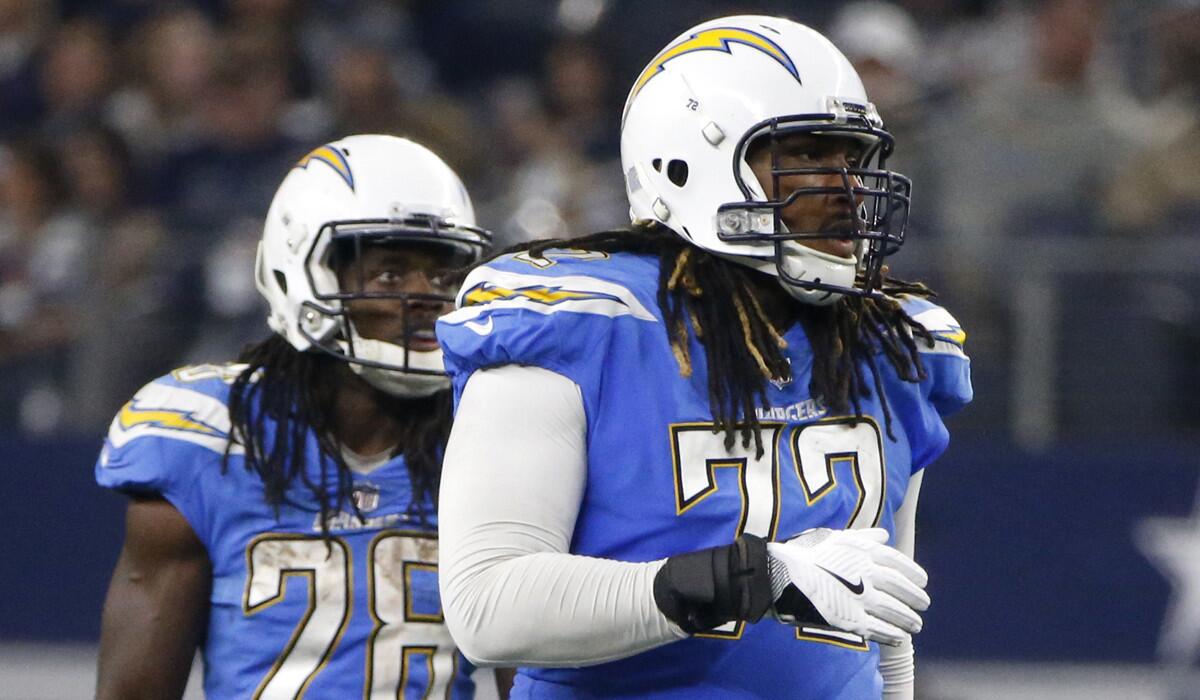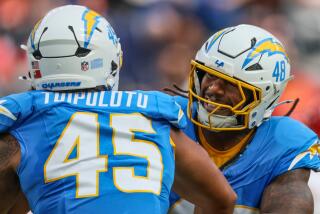Chargers’ Joe Barksdale breaks silence on his daily battles that have nothing to do with football

- Share via
The thoughts Joe Barksdale had wrestled with for as long as he could remember started to get louder.
“Just kill yourself. Just do it. What’s the point of living if you’re going to be this miserable the rest of your life? Just kill yourself.”
It was early November 2017 and Barksdale, the Chargers’ starting right tackle, sat in the team’s training room. He’d just found out he wouldn’t be playing in an upcoming game against Jacksonville after injuring his foot during a fight with a teammate.
He’d missed the previous two games with a toe injury that had been bothering him for more than a month. Now, he was going to be out again.
He cried.
His severe depression — something Barksdale calls the “monkey” always on his back — had gotten the best of him. Truth didn’t matter anymore. Only sadness did.
He got home and sharpened a knife, his mind racing. His wife, Brionna, convinced him to put it down. They talked, he calmed, and the crisis was averted.
Barksdale, who is on medication and in therapy, is sharing his story in the hopes of becoming an advocate for people suffering from chronic depression.
“If I could save another person, maybe that’s why the attempts [to harm himself] didn’t work,” he said.
During a wide-ranging interview with The Times, Barksdale, 29, said he was physically, emotionally and sexually abused as a child.
He hesitated to talk about the abuse at first before deciding to share his experience. “I was molested when I was younger,” he said. “It happened.”
It was the beginning of childhood filled with insecurities and anxieties.
He felt like a burden because of his size. He was expensive to clothe and feed. He was more interested in engineering than he was in sports. Older kids in inner-city Detroit picked on him.
“Everything that’s happened to me going forward has just piled onto it,” he said. “It’s not going away. They’re like tattoos.”
As he continued to fight a sadness he knew would stay with him, Barksdale found one way to feel better.
Less than four years after learning how to play guitar — at former coach Jeff Fisher’s suggestion — Barksdale just released his debut album, “Butterflies, Rainbows & Moonbeams.”
“If he was stressed out, where some people might go and smoke a cigarette or something, he’d go and pick up his guitar,” Brionna said. “His guitar was his outlet, and once he started writing music it was even better because he could get those thoughts and feelings out in words and music.”
Brionna wrote the lyrics to the most personal song on the album, “Journey to Nowhere,” after a tough night for Barksdale due to his depression.
On the album’s cover, Barksdale has a massive smile on his face — one he’s not faking.
“Music is everything,” Barksdale said. “I’ve always wanted to fly. I’ve always had this obsession with flight. Birds are the coolest, watching things move through the air and not be hindered by gravity as much as I am. When I play my guitar — not all the time but if I’m soloing or if I just let go and play — I feel like I’m flying. It’s the coolest thing ever.”
He loves Jimi Hendrix. Earlier this season, he played a game with customized cleats inspired by Hendrix’s guitar from the famed Monterey Pop Festival.
And while playing in St. Louis for the Rams, Barksdale began to fall in love with the blues because of the way musicians were able to convey feelings without uttering a word.
“It’s telling people how you feel without you having to talk to them,” he said.
Getting players to talk is one of the biggest challenges faced by NFL mental health advocates.
“The challenge is when they’re hurting emotionally and you’ve been taught your whole life to stuff it, it becomes difficult to say anything,” said Dwight Hollier, the NFL’s vice president of wellness and clinical services.
Hollier, a former player, said the league has a number of programs to help players and their families deal with mental health issues. One of those programs, NFL Life Line, is a 24-hour crisis hotline available to current and former players and their families. Hollier said the number receives between 20 and 30 calls per month.
Barksdale has called that number before and it didn’t work for him. But with mental health treatments, there are no fool-proof methods.
“No one had any answers for me,” Barksdale said. “…They wanted to help. But they couldn’t. At the end of the day, I still felt … fear, shame, guilt, denial and anxiety.”
Barksdale had to fight all those feelings in sharing his depression with teammates. He’s spoken to a small handful of players including Chargers quarterback Philip Rivers.
“They were really supportive. I think it answered a lot of questions to them,” Barksdale said.“There are the symptoms and all that, but without proper understanding of what’s going on, you just look like you have bad days where you just show up and you’re miserable for whatever reason or you’re angry for whatever reason. It connected a lot of the dots for them. They were super supportive.
“This goes to show you the stigma in the league. All three of them told me, ‘Hey, don’t worry. This is between us. I won’t tell anybody.’ My thing was, I’m telling you so that you can tell other people.”
Rivers said he was caught off guard by the disclosure. The Barksdale he knew owned a big, contagious laugh. He seemed happy.
“I would’ve never imagined that he was dealing with that,” Rivers said.
Barksdale, out of necessity, had become an expert at hiding his depression.
“I’ve been doing it for 29 years. I know what the alternative is,” Barksdale said. “If I let myself get sad, like really sad, it can go really bad places — like I could not be here tomorrow.”
If it sounds serious, it’s because it is. If it sounds heavy, it’s because it is. If it sounds uncomfortably honest, that’s the point too.
Barksdale is done staying quiet. And he hopes others will join him.
“Some days, you can talk yourself out of it. Some days, you can’t. Some days, it just feels impossible,” he said. “This is who I am. I am as depressed as I am black.”
Twitter: @DanWoikeSports
More to Read
Go beyond the scoreboard
Get the latest on L.A.'s teams in the daily Sports Report newsletter.
You may occasionally receive promotional content from the Los Angeles Times.







